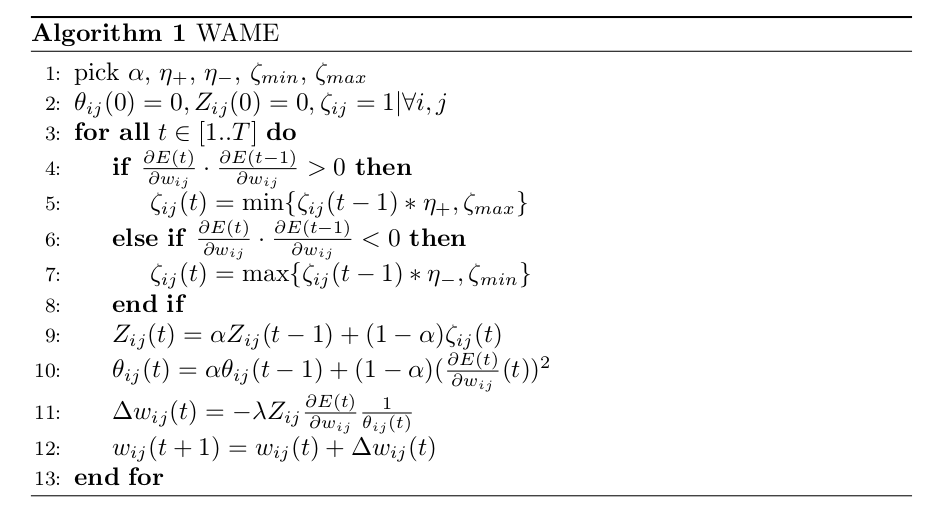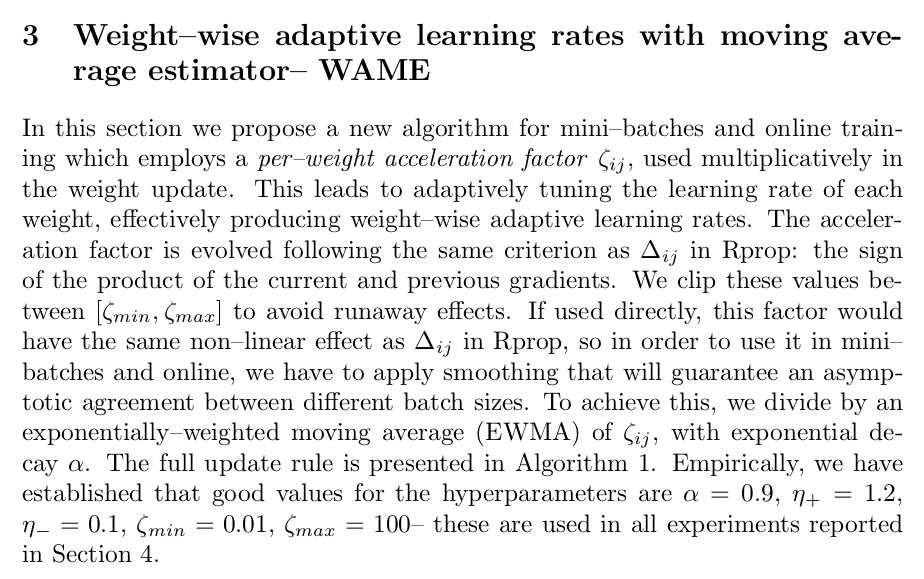Hi,
I’ve tried implementing the Weight–wise adaptive learning rates with moving average estimator, WAME, based on this paper, but my loss doesn’t seem to be going down fast enough.
Here’s my implementation:
import torch
from torch.optim import Optimizer
class WAME(Optimizer):
"""Implements the Weight–wise Adaptive learning rates with Moving average
Estimator.
Arguments:
params (iterable): iterable of paramenters to optimize
alpha (float, optional): smoothing constant (default: 0.9)
etas (Tuple[float, float], optional): pair of (etaminus, etaplus), that
are multiplicative increase and decrease factors
(default: (0.1, 1.2))
step_sizes (Tuple[float, float], optional): a pair of minimal and
maximal allowed step sizes (default: (0.01, 100))
"""
def __init__(self, params, alpha=0.9, etas=(0.1, 1.2), step_sizes=(0.01, 100)):
if not 0.0 <= alpha:
raise ValueError(f"Invalid theta: {alpha}")
if not 0.0 < etas[0] < 1.0 < etas[1]:
raise ValueError(f"Invalid eta values: {etas[0]}, {etas[1]}")
defaults = dict(alpha=alpha, etas=etas, step_sizes=step_sizes)
super(WAME, self).__init__(params, defaults)
def __setstate__(self, state):
super(WAME, self).__setstate__(state)
@torch.no_grad()
def step(self, closure=None):
"""Perform a single optimization step.
Arguments:
closure (callable, optional): A closure that reevaluates the model
and returns the loss.
"""
loss = None
if closure is not None:
with torch.enable_grad():
loss = closure()
for group in self.param_groups:
for p in group["params"]:
if p.grad is None:
continue
grad = p.grad.data
if grad.is_sparse:
raise RuntimeError('WAME does not support sparse gradients')
state = self.state[p]
# State initialization
if len(state) == 0:
state["step"] = 0
state["prev"] = torch.zeros_like(p.data)
state["theta"] = torch.zeros_like(p.data)
state["z"] = torch.zeros_like(p.data)
state["step_size"] = grad.new().resize_as_(grad).fill_(1)
etaminus, etaplus = group["etas"]
step_size_min, step_size_max = group["step_sizes"]
alpha = group["alpha"]
step_size = state["step_size"]
theta = state["theta"]
z = state["z"]
#print(state)
state["step"] += 1
mul_dx = grad.mul(state["prev"])
if mul_dx > 0:
step_size = min(step_size*etaplus, step_size_max)
elif mul_dx < 0:
step_size = max(step_size*etaminus, step_size_min)
z = alpha * z + (1 - alpha) * step_size
theta = alpha * theta + (1 - alpha) * (grad ** 2)
new_grad = (z * grad) * (1 / theta)
# update paramenters
p.sub_(new_grad)
state["prev"].copy_(grad)
return loss
The algorithm itself is as below:
Any help as to what I’ve done wrong?

